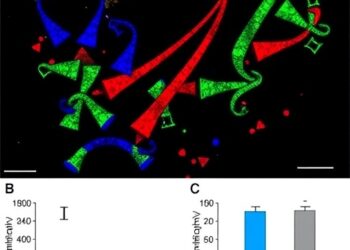In a groundbreaking development in the field of rare disease treatment, researchers have successfully utilized an artificial intelligence (AI) tool to identify an existing medication that offers hope to a patient suffering from idiopathic multicentric Castleman’s disease (iMCD). This disease is notoriously difficult to treat, with a grim prognosis and limited therapeutic options available. However, this recent advancement suggests that AI-based drug discovery could pave the way for innovative treatments across various rare conditions, potentially changing the lives of many patients who suffer in silence.
The study, recently published in the prestigious New England Journal of Medicine, was spearheaded by a distinguished team at the Perelman School of Medicine at the University of Pennsylvania. Using machine learning—an advanced AI technique—the researchers sifted through a vast database of approximately 4,000 medications. Their analysis revealed adalimumab as the “top-predicted” agent that could effectively target iMCD. This monoclonal antibody, which has gained FDA approval for a range of inflammatory conditions including arthritis and Crohn’s disease, emerged as a promising candidate due to its mechanism of action as a tumor necrosis factor (TNF) inhibitor.
Delving deeper into the biological underpinnings of iMCD, the research team identified that TNF signaling might be a crucial factor exacerbating the disease. Elevated TNF levels were detected in patients exhibiting severe manifestations of iMCD, leading to a hypothesis that the immune response in these individuals is significantly overactive. This inflammatory cascade can cause serious complications, including the swelling of lymph nodes and multi-organ failure, underscoring the urgent need for effective interventions.
The study’s leading authors, David Fajgenbaum, MD, and Luke Chen, MD, took a pivotal leap by administering adalimumab to the patient, who had been directed toward hospice care due to treatment failures. Remarkably, following this innovative approach, the patient experienced a profound turnaround in his health, achieving nearly two years of remission. Dr. Fajgenbaum, who is not only a physician but also a patient diagnosed with iMCD, has dedicated his career to uncovering life-saving treatments, driven by his personal journey with the disease.
This instance of drug repurposing—using a known medication for a new therapeutic purpose—highlights a powerful strategy that holds promise not just for iMCD, but for a wide array of diseases with similar inflammatory pathways. It suggests that complex conditions, despite their diverse manifestations, may share underlying biological similarities. By pinpointing common immunological triggers, researchers can explore pre-approved drugs that may offer new avenues for treatment, thus accelerating the pathway to patient care and improving survival rates.
Fajgenbaum’s own experience with drug repurposing has equipped him with unique insights that meld his medical expertise with personal resilience. His commitment is palpable not only through his clinical pursuits but also via his advocacy work as a co-founder of Every Cure, a nonprofit organization dedicated to leveraging the power of AI in the discovery of repurposed drugs. This endeavor aims to make significant strides in analyzing massive datasets of approved medications, thereby enhancing the potential for swift, impactful treatment options for those with rare diseases.
The AI framework employed in this research was developed by collaborators from Penn State University, whose pioneering contributions in data analysis and computational biology have established a robust platform for identifying novel therapeutic candidates. This collaborative effort underscores the importance of interdisciplinary approaches in advancing medical science.
The implications of this study extend beyond the remarkable case of one patient; they signify a potential paradigm shift in how we approach treatment for rare diseases. With only about 5,000 individuals diagnosed with Castleman’s disease annually in the United States, the condition is considered rare. However, the translation of findings from this research could benefit numerous patients around the globe who are weathering life-threatening flare-ups. The hope is that as additional research is conducted, many more individuals will gain access to efficacious treatments that could significantly alter their disease trajectories.
Furthermore, the research has catalyzed plans for future studies, including a clinical trial set to commence focused on exploring the efficacy of a JAK1/2 inhibitor for iMCD. This embodies a commitment to rigorous scientific investigation aimed at refining therapeutic strategies for complex immune disorders. The combined strategies of machine learning, laboratory research, and clinical trials exemplify the multifaceted approach necessary to tackle the challenges posed by rare diseases.
As the researchers continue their work, a pressing need for patient advocacy and support remains. The experience of iMCD patients and their families navigating through a labyrinth of treatment options is invaluable in shaping research priorities and methodologies. By integrating patient perspectives into the design and execution of clinical trials, researchers could enhance the likelihood of achieving outcomes that meet the unique needs of individuals battling rare diseases.
In summary, this seminal study demonstrates the powerful intersection of AI technology and medical research. The successful application of adalimumab in the context of iMCD marks an essential stride towards not only improving patient outcomes but also the broader endeavor of repurposing known drugs for uncharted medical territories. As this landscape evolves, continued investment in innovative research and collaborative spirit will play crucial roles in overcoming the hurdles that patients with rare diseases face each day.
Subject of Research: People
Article Title: Identifying and Targeting TNF Signaling in Idiopathic Multicentric Castleman’s Disease
News Publication Date: Not specified
Web References: Not specified
References: Not specified
Image Credits: Not specified
Keywords: Machine learning, Drug therapy, Clinical research, Drug research, Tumor necrosis factors, Cytokine storm




